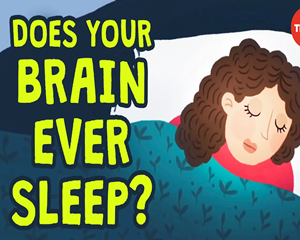Many animals need sleep. Even brainless jellyfish enter sleep-like states where they pulse less and respond more slowly to food and movement.
大多动物都需要睡觉。甚至没有大脑结构的水母都会进入类似睡眠的状态,即脉冲减少,它们会减缓对食物和周围活动的反应。
But all of the threats and demands animals face don't just go away when it's time to doze.
但是动物所面临的威胁和需求,并不会因为睡眠而自动消失。
That's why a range of birds and mammals experience some degree of asymmetrical sleep where parts of their brain are asleep and other areas are more active.
这就是为何许多鸟类和哺乳类动物会经历某种程度的“半睡眠”现象,即大脑的一部分处于休眠状态,而另一部分则处于清醒状态。
This is even true for humans. So how does it work? All vertebrate brains consist of two hemispheres: the right and left.
甚至人类也会这样。那这究竟是怎样做到的呢?所有脊椎动物的大脑都由两个半球组成:左脑和右脑。
Brain activity is usually similar across both during sleep.
通常,左右脑在睡眠状态中有相似活动。
But during asymmetrical sleep, one brain hemisphere can be in deep sleep while the other is in lighter sleep.
但在“半睡眠”状态下,大脑的其中一个半球会进入深度睡眠,而另一个半球则会进入浅度睡眠。
And in an extreme version called "unihemispheric sleep," one hemisphere may appear completely awake while the other is in deep sleep.
在一种叫“单半球睡眠”的极端情况下,其中一个脑半球会处于完全清醒的状态,而另一个则处在深度睡眠中。
Take bottlenose dolphins. Their breathing is consciously controlled, and they must surface for air every few minutes or they'll drown.
以宽吻海豚为例。它们需要时刻控制呼吸,每几分钟就需要浮上水面呼吸,不然就会有溺水的危险。
When they have a newborn calf, they must actually swim nonstop for weeks in order to keep it safe.
当海豚有了新生的幼崽,它们会不停地游上好几周,以便守在幼崽的身边保证它的安全。
So dolphins sleep unihemispherically, with just one hemisphere at a time.
所以海豚是单半球睡眠生物,每次只用一边大脑睡觉。
This allows them to continue swimming and breathing while snoozing.
这使得它们在打盹的同时,也能继续游泳和呼吸。
Other marine mammals also need asymmetrical sleep. Fur seals might spend weeks on end migrating at sea.
还有其他海洋哺乳动物需要单半球睡眠。像是毛皮海豹,迁徙时会在海里游上数周。
They slip into unihemispheric sleep while floating horizontally, holding their nostrils above the surface,
其间会横向漂浮在水面进入单半球睡眠,将鼻孔伸出水面,
closing their upward-facing eye, and keeping their downward-facing eye open.
闭上露出水面的那只眼睛,同时睁开水面以下的那只眼睛。

This may help them stay alert to threats from the depths. Similar pressures keep birds partially awake.
这可以使它们对海底深处的威胁保持警觉。类似的生存压力也让鸟类保持“半睡半醒”的习惯。
Mallard ducks sleep in groups, but some must inevitably be on the peripheries.
绿头鸭喜欢抱团睡觉,但总有一些会不可避免落单在边上。
Those ducks spend more time in unihemispheric sleep, with their outward-facing eyes open and their corresponding brain hemispheres more active.
那些在边上的鸭子多数时间都处于单半球睡眠,它们会睁开朝外的那只眼睛,与此同时,相对应的大脑半球也会比较清醒。
Other birds have been shown to catch z's in midair migration.
研究证明其他一些鸟能在半空迁徙时睡觉。
While undertaking non-stop transoceanic flights of up to 10 days, frigatebirds either sleep with one or both hemispheres at a time.
当进行长达10天不眠不休的越洋迁徙时,军舰鸟可以只有一边大脑在休息,或是同时两侧大脑都在休息。
They do so in seconds-long bursts, usually while riding air currents.
它们会在快速猛冲时以这种方式入睡,尤其是穿过气流的时候。
But the frigatebirds still sleep less than 8% of what they would on land, suggesting a great tolerance for sleep deprivation.
但军舰鸟在空中的睡眠时间仍比在陆地上少8%,可见它们对睡眠不足有很强的耐受力。
It's currently unclear whether asymmetrical sleep packs the same benefits as sleep in both hemispheres and how this varies across species.
目前我们仍不清楚“半睡眠”是否与“完全睡眠”有一样的好处,并且这一现象是如何因物种而异的。
In one experiment, fur seals relied on asymmetrical sleep while being constantly stimulated.
在一项实验中,面对不断的刺激,毛皮海豹倾向于依赖“半睡眠”。
But in recovery, they showed a strong preference for sleep across both hemispheres, suggesting that it was more restorative for them.
但在补充体力时,它们表现出了大脑两侧同时睡觉的强烈倾向,说明这种方式更有利于它们体力的恢复。
Dolphins, on the other hand, have been observed to maintain high levels of alertness for at least five days.
另一方面,海豚在至少五天时间内都保持着高度警惕。
By switching which hemisphere is awake, they get several hours of deep sleep in each hemisphere throughout a 24-hour period.
通过对两侧大脑的交替使用,它们的每一侧大脑在二十四小时内都得到了几小时的深度睡眠时间。
This may be why unihemispheric sleep alone meets their needs.
这也许是为什么“半睡眠”足以满足它们的需求。
So, what about humans? Have you ever woken up groggy after your first night in a new place?
那么,人类又是怎样的呢?当你在新环境过夜后,醒来是否会觉得大脑昏昏沉沉?
Part of your brain might've spent the night only somewhat asleep.
那是因为你的部分大脑没有得到完全的休息。
For decades, scientists have recognized that participants sleep poorly their first night in the lab.
几十年来,科学家们已经意识到实验对象在实验室过夜的第一天,睡得并不好。
It's actually customary to toss out that night's data.
所以,通常他们会放弃当晚的实验数据。
In 2016, scientists discovered that this "first night effect" is a very subtle version of asymmetrical sleep in humans.
2016年,科学家们发现这种“初夜效应”,是一种非常不明显的人类“半睡眠”的例子。
They saw that, during the first night, participants experience deeper sleep in their right hemisphere and lighter sleep in their left.
他们发现,在第一晚实验对象的右脑会经历更深度的睡眠,而左脑则是较浅的睡眠。
When exposed to infrequent sounds, that lighter sleeping left hemisphere showed greater bumps in activity.
当出现低频率声音时,较浅睡眠的左脑在活动中显示出了更大的波动。
Participants also woke up and responded to infrequent sounds faster during the first night than when experiencing deep sleep in both hemispheres during nights following.
在第一晚实验对象也会醒来并对低频声音做出更快的反应,而第二晚大脑两侧则都处于深度睡眠。
This suggests that, like other animals, humans use asymmetrical sleep for vigilance, specifically in unfamiliar environments.
这一研究结果表明,像其他动物一样,人类的“半睡眠”是警惕的表现,特别是当他们处于不熟悉的环境中。
So, while your hotel room is obviously not trying to eat you and you're not going to die if you don't continue moving,
显然,你的宾馆房间不会吃了你,即使你一动不动,你也不会死,
your brain is still keeping you alert. Just in case.
这只是你的大脑表现警惕的方式,以防万一。


